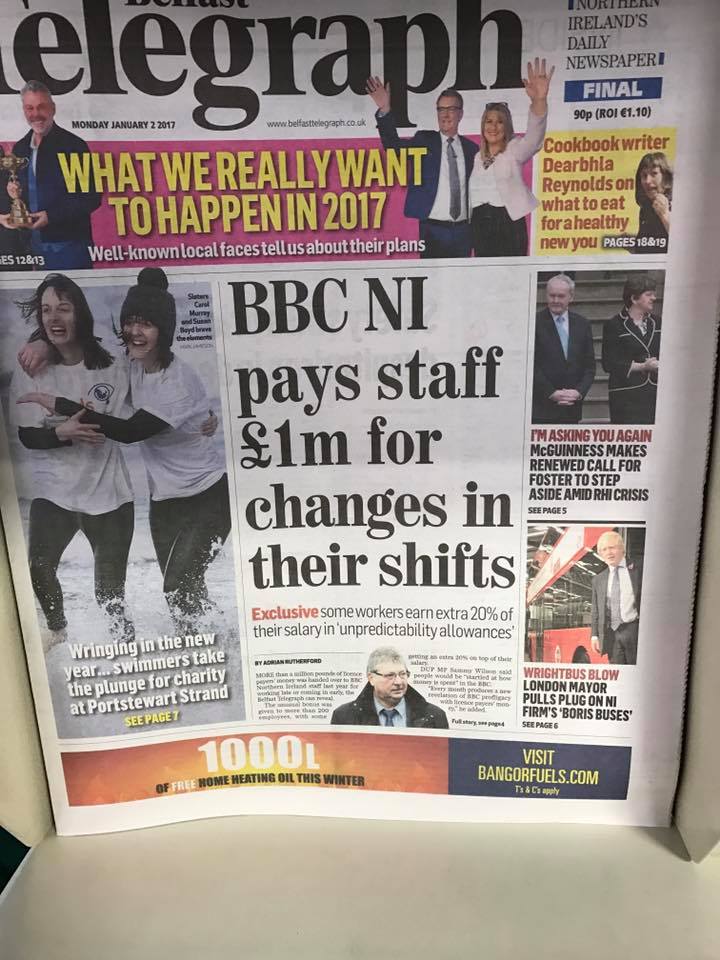So you’re a BBC news editor faced with a choice…the pro-EU mandarin, Ivan Rogers, has gone all Kamikazi, and you’re reporting the aftermath of his suicide attack on the Brexiteers. Do you report his critics’ or his defenders’ words? You being a BBC employee naturally know what’s in our best interest and shape the news to present Rogers as the telling-truth-to-power victim of the Brexit thought-police. The reality? A pro-EU civil servant went public with a hugely anti-Brexit message with the intent of putting pressure on the government to comply with his own pro-EU views…and the BBC were there to help as they were given the exclusive scoop…wonder why. Possibly because they are the most powerful, and pro-EU, media platform out there and one guaranteed to give Rogers a favourable platform from which to peddle his pro-EU spiel. How right he was.
Today we had some interviews on the Today programme….on one we had Lord Marland backing Rogers and telling us how the civil service was incapable of negotiating Brexit and Sir Robert Cooper telling us there is a policy vacuum in government.
Then later we had Matts Persson, a Cameron EU advisor, on. Interestingly he said that the headlines [the BBC of course the worse culprit ed.] had been very unfair, that is, misleading, after Rogers’ resignation…They had reported Rogers’ claim that the government was ‘muddled’ and lacked the negotiating skills but both those claims were wrong….planning, as you might expect, was ‘far advanced’ and there was good expertise in the civil service. Not only that but the negotiating position was very clear.
Not at all the message the BBC wanted to peddle and indeed they didn’t. In the follwoing news bulletins which messages do you think the BBC news editor chose? Not Persson’s but both Marland and Cooper’s negative take on Brexit. Persson doesn’t get a mention at all anymore.
The BBC has also chosen not to report the essential point about Rogers’ not being fit to lead the Brexit negotiations…not only is he a dyed-in-the-wool pro-EU mandarin but he lacks the will to tackle EU reform. He was the major stumbling block to negotiating the reforms Cameron claimed he wanted. Rogers said we could not get much so don’t ask for much…a classically bad negotiating stance….so we ask for little and get, of course, even less.
So in effect Rogers empowered the Brexit vote by failing to secure major reforms that were promised. Even more ironically his departure, the departure of a key, for the Remainers, pro-EU person at the Brexit negotiations, was the result of his doom and gloom being reported by the pro-EU BBC….a feat of which they were boasting as he announced his resignation….lol.
All that smacks of very bad judgement, both politically and tactically…he placed himself in the firing line, and the BBC, thinking they were helping to undermine Brexit, reported with glee his words that Brexit would take 10 years and may not even happen. He completely misjudged how we should negotiate with Brussels on the reforms, proably coloured by his own pro-EU feelings…it is likely he didn’t actually want any reforms. Not only that but he was also the one who advised May not to promise EU migrants in the UK that they could stay regardless…and for which May got enormous amount of flak, not least from the BBC.
The BBC of course doesn’t highlight those major flaws in his CV…look at this report in the immediate wake of his resignation….no mention of his damaging role in the ‘reforms’ and no mention that he is very pro-EU…
UK’s ambassador to the EU Sir Ivan Rogers resigns
Strangely the BBC totally ignores what Tim Shipman said in his book about Rogers…remember Tim Shipman’s book? The one that the BBC relentlessly once reported when they thought it had negative things to say about Brexit? No so keen now to dip into the book for quotes…such as this…all pretty damning for him…
Tim Shipman reveals in his unrivalled referendum book All Out War, Cameron’s aides blame Rogers for blocking them from seeking a better deal on immigration and the ECJ:
‘We were too beholden to Tom Scholar and Ivan Rogers,’ one Cameron adviser said. ‘They were status quo. They were happy to take “No” for an answer, happy to believe things weren’t possible when they could be possible. I’ve lost count of the number of times Ivan threatened to resign.’ The politicos say Rogers was aggressive in dismissing their arguments, and went over their heads to Cameron: ‘He would send emails that were the stuff of legend, saying why didn’t we know anything? We were just politicos, we didn’t understand.’ Another aide said Rogers’ emails were ‘notorious’.
Rogers also clashed with the special advisers over their desire to include reforms of the European Court of Justice in the renegotiation. ‘Korski had a long-running battle with officials saying that we needed to do something, and he kept getting told that it was impossible to do something,’ a Number 10 source said. A range of proposals were put forward, ranging from new rules on the selection of judges to proposals for the EC] to get out of lower-level decisions. Their advocates believe the plan would have allowed Britain to get a serious review of the court on the agenda. It was rejected by officials over the summer.
The BBC does bring us Rogers’ resignation letter in full...with the BBC own selective musings and annotations inserted where they think we can benefit from their insight and perception. Naturally the points selected are negative for Brexit and the BBC’s own interpretation ramps that up, sexing up the negative and essentially inventing meanings and intent to the words….and what you don’t get is any analysis from the BBC that actually challenges any of Rogers’ assertions….the BBC just accepts his claim that the government has no idea about Brexit and that there are no people skilled enough to negotiate it in the UK….as said above they in fact completely ignore anyone who suggests otherwise and doesn’t adopt the correct narrative….and whilst parsing every word that seemingly criticises the government the BBC doesn’t bother with his final words to his fellow civil servants…
I hope that you will continue to be interested in the views of others, even where you disagree with them, and in understanding why others act and think in the way that they do.
Why would he need to tell them that? If they are impartial civil servants they would surely do their job regardless of whether they voted Remain or not….but seemingly Rogers thinks that might not be the case…which of course, ironically, is why he himself had to go….a point the BBC seems to avoid reminding us of preferring instead to ‘report’ the Remain camp’s ‘concern’ about Rogers resignation [which of course is very telling in itself].



 Hillary Clinton
Hillary Clinton Jason Leopold
Jason Leopold
